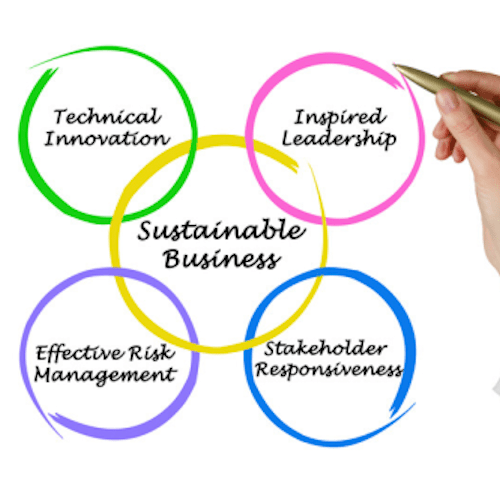Environment, Safety, Health
Sustainable Practices – Why They Matter!
Sustainable behavior is key to reversing the effects of “our” planet’s environmental degradation. Every day the media reminds us of the rapidly changing environment and its negative impact on fauna and flora alike. Most citizens and businesses recognize the imperative to change our practices of land development, fossil fuel use, non-stop manufacturing, and excessive consumption to reduce human contributions to climate change.
Incorporating sustainable best practices is essential for business leaders to halt and then reduce the impact of a rapidly changing ecosystem and its negative consequences. Business sustainability is the practice of adopting green business practices that benefit the interest of the local and global community. Eco Centric businesses focus on their operational impact on society and the environment and not exclusively on profit and shareholder return on investment.
Sustainable businesses follow a term coined by John Elkington in 1994 the triple bottom line. The three components are profits, people, and the planet. A sustainable business earns profits by being socially responsible and protecting our use of the planet’s resources. Companies that address climate change by adopting green policies, technologies, and strategies for growth could potentially realize several trillion dollars in economic benefits.
What Goes in must Come Out
Virtually all produced goods include some form of packaging. Unfortunately, a portion of this packaging is improperly disposed of and results in polluting our land, rivers, and oceans. The Great Pacific Garbage Patch illustrates mishandled disposal of a variety of waste in which plastic is the largest contributor. The patch is estimated to be the size of Texas. The patch’s contents kill aquatic and avian wildlife through plastic ingestion and disintegrated plastics reduce into microplastics contaminating the entire food change including humans through food ingestion.
According to environmental experts these “worst” disposal practices dramatically accelerate species extinction hundreds of times higher than the natural rate. Based on projections humans are on pace to produce 27 billion tons of solid waste by 2050. CO2 emissions associated with manufacturing are also projected to increase planetary warming by 2-dgrees Celsius.
According to the Paris Climate Accord businesses can reduce by 2030 60% emissions by implementing best production and waste management practices.
Sustainable Perceptions – Consumer and Business
The Corporate Seal Responsibility study by Cone Communications reveals most American consumers have these expectations.
- Businesses drive social and environmental action of their own accord without being forced by government regulations. Survey respondents identified ethics and integrity as the No. 1 reason for pursuing business sustainability.
- Sustainability needs to influence business strategy and value creation.
- Consumers make purchases because the manufacturers demonstrate environmental stewardship.
Who makes a difference – Everyone
We can all contribute to environmental sustainability through our buying practices and product selections. In addition, company leaders can make strategic sustainability decisions that benefit the business, its employees, its customers, and the planet.
Business managers and employees contribute by communicating to management their unique insights into the day-to-day operations and product processing. It’s important to create a company culture that reflects eco-friendly values and makes employees comfortable with sharing their ideas, including those regarding sustainability.
What’s in It for a Sustainable Businesses?
Per the Triple Bottom Line a business must operate profitably to survive. Incorporating sustainable best practices, a company derives numerous benefits. Integrating sustainable practices to improve operational efficiency cuts costs. For example, converting property illumination to LED lights reduces energy consumption and labor expenses via reduced maintenance operations. In addition, tax incentives including credits, rebates, and savings support bottom line profitability.
Incorporating recycled paper and plastic in packaging reduces natural resource extraction and processing, not to mention reduces energy consumption and a host of other expenses.
Reputation Management – So who cares?
A business is only successful if its customers are satisfied. Increasingly, purchasers expect more than products. They also want to purchase goods from a manufacturer or service provider who shows leadership and aligns messages with actions. People view sustainability as a plus, and companies with green values are eager to highlight them. Going green shows the customer the company cares about more than just making money.
EcoCentricNow (ECN) Sustainability Commitment
ECN’s promotes sustainability through a selection of products that reduce environmental impact.
LED property lighting significantly reduces electricity consumption which translates into reduced air pollution from power plants. Luminaire longevity lowers replacement frequency further reducing packaging waste and assortment of transportation and handling cost. In addition, lower energy consumption reduces strain on the electrical distribution grid.
Handheld lighting also optimizes the use of LED technology. Our product selections center on LED technology incorporated into flashlights, lanterns, and emergency lights. Our products provide years and decades of operational use. In several instances merchandise incorporates recycled plastic or paper in associated packaging.
Learn more about EcoCentricNow by visiting https://ecocentricnow.com

